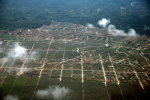News
11.05.2012
UN Endorses Land Tenure Guidelines

The Committee on World Food Security (CFS) has today adopted a series of guidelines, which aim to improve the governance of people’s tenure of land, fisheries and forests, while also ensuring food security. The guidelines address various issues ranging from the protection of informal land rights and the transfer of tenure rights, to the right of women and indigenous people to have access to land. They are also intended to prevent land grabbing by ensuring responsible forms of investment. The endorsement of the principles was the result of a three year process with the participation of various stakeholders. “Land, fisheries and forests cannot be left at the mercy of markets and speculators", said Flavio Valente, Secretary General of FIAN International, a human rights organisation engaged in the preparation process. Now governments must commit themselves to implementing the guidelines and adapting national policies. According to FAO Director-General José Graziano da Silva “It's a starting point that will help improve the often dire situation of the hungry and poor”.
- FAO Media Centre: Countries adopt global guidelines on tenure of land, forests, fisheries
- CFS: Voluntary Guidelines on the Responsible Governance of Tenure of Land, Fisheries and Forests in the Context of National Food Security
- FIAN International: FAO Tenure Guidelines a Modest Step, Governments Must Commit to Implementation
08.05.2012
New Club of Rome report paints a grim future

The Club of Rome launched their latest report “2052: A Global Forecast for the Next Forty Years” yesterday which issues a warning about humanity’s ability to survive. The grim conclusion is that mankind will soon be confronted with the limits of the planet if it continues with the over-consumption and short-sightedness of the current political and economic model. “We already live in a manner that cannot be continued for generations without major change. Humanity has overshot the earth’s resources“, said Jorgen Randers, author of the report. The report predicts that CO2 emissions will continue to increase, leading to a rise of 2 degrees by 2052, and that economic growth will stagnate due to slower productivity growth in the current dominant economies. Global population is predicted to peak in 2042 due to fertility falling in urban areas. The report comes 40 years after the same think tank published a report entitled “The Limits of Growth”, which at the time caused a controversy for questioning the belief in endless growth.
04.05.2012
Uncertain Future for EU biofuels

The European Commission failed to reach agreement on the future of the EU biofuels policy at an orientation meeting last Wednesday. The 27 commissioners had gathered to choose one of three policy options designed to address indirect land use changes (ILUC) related to biofuels. ILUC occur if forests are cleared or peatland is dried to meet the growing demand for biofuels, which in turn leads to a net increase in carbon dioxide emissions. Studies show that indirect emissions are far lower for ethanol than for biodiesel. The aim of the Commission’s meeting was to reach consensus on how to account for this ILUC process within the EU sustainability criteria for biofuels. However internal disputes prevented concrete action. Tough regulations on ILUC could potentially endanger Europe’s 13 billion euro biofuels industry, which is why agribusiness is now attempting to flex its muscles. Discussions will continue to find a compromise before the end of the year.
02.05.2012
African Organic Conference opens today

The 2nd African Organic Conference “Mainstreaming Organic Agriculture in the African Development Agenda” will today be opened in Lusaka, Zambia. From 2- 4 May, over 300 delegates from 40 countries and four continents, including representatives from governments, UN agencies, NGOs, the private sector and research institutions, will participate in the event. The conference has been organised by the Organic Producers and Processors Association of Zambia (OPPAZ) in cooperation with the Zambian Ministry of Agriculture and Livestock, the UN Conference on Trade and Development (UNCTAD) and Grow Organic Africa. The aim of the event is to promote organic agriculture in the policies of African governments as well as among NGOs and development partners. Successful organic agricultural projects and case studies from Africa will be presented. Organic agriculture in Africa is gaining impetus: More than 1 million hectares of agricultural land and roughly 530,000 farmers are certified, according to organic standards in Africa.
26.04.2012
Brazilian Congress approves controversial Forest Code

On Wednesday, after several months of political controversy and constant pressure from the agribusiness sector, the Brazilian Congress approved substantial changes to the existing Forest Code. The new legislation grants amnesty to individuals who illegally cleared forests prior to 2008. According to environmental groups, the Forest Code weakens the protection of the Amazon rainforest, contributing to carbon emissions. Just a few weeks before the country is due to host the Rio+20 UN Conference on Sustainable Development, this vote “has cast a dark shadow across Brazil's reputation as a global leader in the fight against deforestation and climate change”, said Paulo Adario, Greenpeace Brazil. All eyes will now be on President Dilma Rousseff who could still veto the bill, or at least parts of it.
17.04.2012
April 17th: Worldwide mobilisation for the International Day of Peasant’s Struggle

Small-scale farmers, and organisations supporting them, are today marking the International Day of Peasant’s Struggle, commemorating the massacre of 19 landless Brazilian farmers in 1996. More than 250 actions and demonstrations will take place across the globe. The international farmers’ movement La Via Campesina is this year mobilising against the current trend of land grabbing: States, transnational corporations and hedge funds are depriving local farmers of their land and leading to increased hunger. “In the run up to the Rio+20 Earth Summit, farmers and supporters of the food sovereignty and agroecology movement are actively opposing the ‘greening of capitalism’ that is now promoted at the international level”, said Henry Saragih, general coordinator of la Via Campesina.
17.04.2012
Sofía Gatica from Argentina takes on Monsanto, wins Goldman Environmental Prize
Hats off to this mother of three who got fed up and took charge. Thirteen years ago, Sofía Gatica’s newborn died of kidney failure after being exposed to pesticides in the womb. After the despair came anger, then a fierce determination to protect the children in her community and beyond. Today, she’s one of six grassroots leaders from around the world receiving the Goldman Environmental Prize, in recognition of her courageous — and successful — efforts.
16.04.2012
Greenpeace Philippines warns of GMOs in manufactured food
ASIDE from the safety of food with genetically modified organisms, Greenpeace said on Thursday that the ownership of these food makers should also be a cause for concern about GMOs. “GMOs are patented and owned by the companies that develop, produce, and market them as quick-fix solutions to hunger and poverty. After more than 20 years of commercialization, GMOs have only brought us farther from [our] food security goals,” said Greenpeace in a briefing paper. The group continues to question the safety of GMOs as well as the process being implemented by the Philippine government for GMOs.
12.04.2012
Biofuels in the USA - Growing risk for taxpayers and wildlife
Good biofuel crops can make great invasive species. That’s one of the findings of a new report released today by the National Wildlife Federation. Growing Risk: Addressing the Invasive Potential of Bioenergy Feedstocks explores the challenges and policy solutions surrounding the use of non-native and potentially invasive bioenergy crops. Numerous non-native and genetically modified species are already being considered for use as biomass feedstocks. Growing these plants may appear to be a great source of homegrown renewable energy, but without proper precaution, producers run the risk of unleashing the next big invasive species catastrophe that could devastate native ecosystems, deplete scarce water resources and require significant resources to control.
12.04.2012
U.S. scientist says biotech companies encouraging GMO-herbicide treadmill
In a paper published recently in BioScience, David Mortensen, professor of weed ecology at Penn State, and fellow researchers criticized this “single tactic” approach of herbicide-tolerant GM crops to control weeds. The paper says the approach will dramatically increase herbicide use and threaten environmental quality, create even more herbicide resistant “superweeds,” and encourage continued neglect of public research and extension investment in integrated weed management approaches in favor of chemical company profit-driven GMO approaches. In 2010, Mortensen told a US House Oversight Committee that the government should restrict the use of herbicide-tolerant GM crops and impose a tax on GM seeds to fund research and educational programs for farmers.

